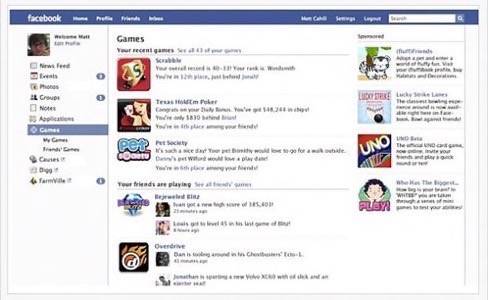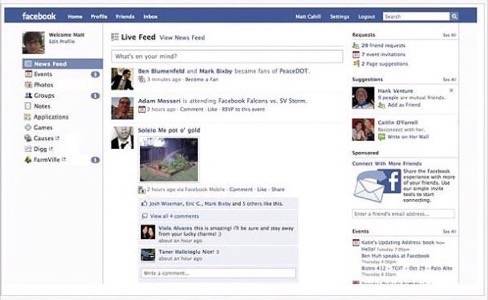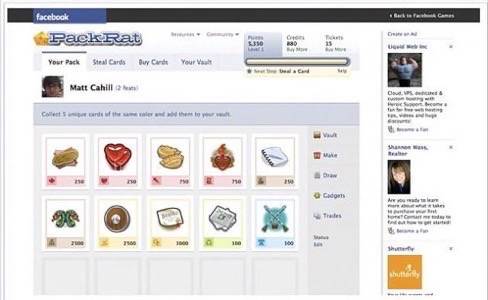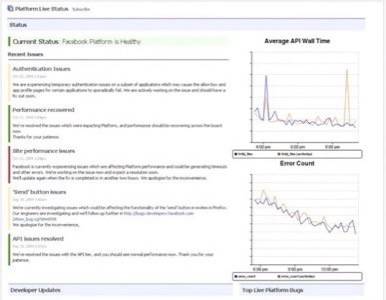Today, Facebook has published a developer roadmap outlinining upcoming relevant changes and a rough timeline for each.

Changes include developer access to user emails, more prominent app displays on user profiles, all-new homepage dashboards for apps and games, and improvements to Open Graph and Analytics APIs. Facebook Connect libraries will be “smaller, clearer, and faster,” and app policies and principles will be streamlined and uniformly enforced. Read on for details and screenshots of the new faces of Facebook apps.
“These updates are designed to simplify communication for users and developers, improve app discovery and engagement, and provide you with more comprehensive tools for building or expanding your business with Facebook,” writes Facebook product head Ethan Beard on the Facebooks Developer blog post.
“Through these new APIs and tools, we are giving all developers building with Facebook and those in our largest application category – gaming – new ways to attract and engage users.”
Look & Feel Changes
Indeed, Facebook seems to regard gaming as its own monster – something that has taken off to the extent of taking over the platform, and not something that was necessarily anticipated. For that reason, we see of the most interesting changes as drawing a line in the sand between social games and “real” apps.
In this bit of new hotness, you can see Apps displayed on the homepage left-hand menu for easier user discovery that will likely be less dependent on recommendations or invitations from one’s Facebook friends. And Games are now just games, no longer grouped under the general apps umbrella.

The Games Dashboard will also give developers a new communication channel, called “News”, for sending personalized text updates to their users.
One of the more interesting changes that will drive adoption and interaction virally is letting usersfeature their favorite apps on their home pages with bookmarks and new dashboards. “In addition, users will be able to better represent applications on their profile following short-term changes that include focusing profile integration on application tabs, as well as removing profile boxes, the info section of boxes, and the Boxes tab,” writes Beard. Also, the apps that are bookmarked into a user’s homepage menu will have counters, just like Facebook’s own features, to prompt user actions.

Apps are also getting a new canvas layout, “a format that increases brand association with users,” writes Beard.

Communication Changes
App-user communication is rather busted in its current state. Beard acknowledges this fact and presents a preliminary solution. “Application communication in channels like notifications and requests aren’t effectively serving their original purpose. There is a significant opportunity to improve the user experience and reduce spam by replacing them with better features.”
Moving forward, Facebook developers will also be able to interact with users in several different ways. First of all, user-user communication via the platform will be consolidated into streams and inboxes and will have new features to help users remain engaged with apps. User-to-user communications commonly in the notifications and requests channels will be moved to the inbox, as well.
Also, developers will have access to user email addresses. Using the domain @facebookappmail.com, devs will be able to contact users via email through what Beard says will be a safe, secure channel for users.

Developer Product Changes
Beard also highlighted two APIs set to change. The Open Graph API will allow any page on any website to integrate Facebook Page features. This means that users can become Facebook fans of any site or page on the Internet; that page would then appear on the user’s profile and in Facebook search results; and the page will be able to publish stories to the user’s stream. Although this change in itself doesn’t open any Facebook data to the rest of the world, it does significantly increase the boundaries of the walled garden.
Beard also writes that an improved Application Insights Page and new Analytics API are on the way. He promises improved tools, more robust data, and better management capabilities for apps and Facebook Connect-enabled websites.
And speaking of Facebook Connect, those libraries are set to become smaller and faster. Other boons to devs include the public roadmap, a new website for developers, and Platform Live Status, “a central dashboard to view the health of various integration points, bugs, and Platform uptime as well as detail about upcoming changes and improvements to Platform.” The developer blog and status feed will also be available via email subscriptions.
Finally, Facebook’s Developer Principles and Policies have been streamlined and will now be applied across the platform. “In addition,” Beard notes, “we’re retiring the formerly optional Application Verification brand, submission process, fees and badge; the program’s higher standards will be required and applications will be subject to review at any time.”

In terms of reducing the platform’s complexity and increasing its power and speed, Beard concludes, “We are focused on designing Platform in a way that we can run core Facebook applications on the same set of APIs you’re building on. If our technologies aren’t fast, robust, and simple, we will feel the same pains that you do.”
What do our developer friends have to say about Facebook’s proposed changes and attempts at communicating them? Is it helpful to have some idea of what will be happening to the platform, when changes will occur, and why Facebook is making those adjustments?
Another question that interests us is that of cross-platform development: From what other companies would you also like to see developer roadmaps?
Let us know your thoughts in the comments.










